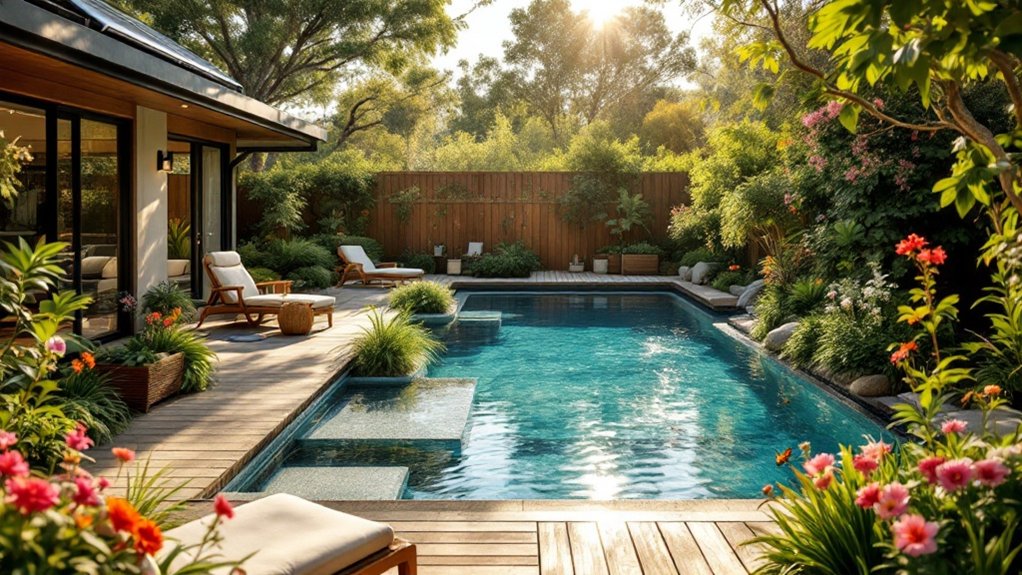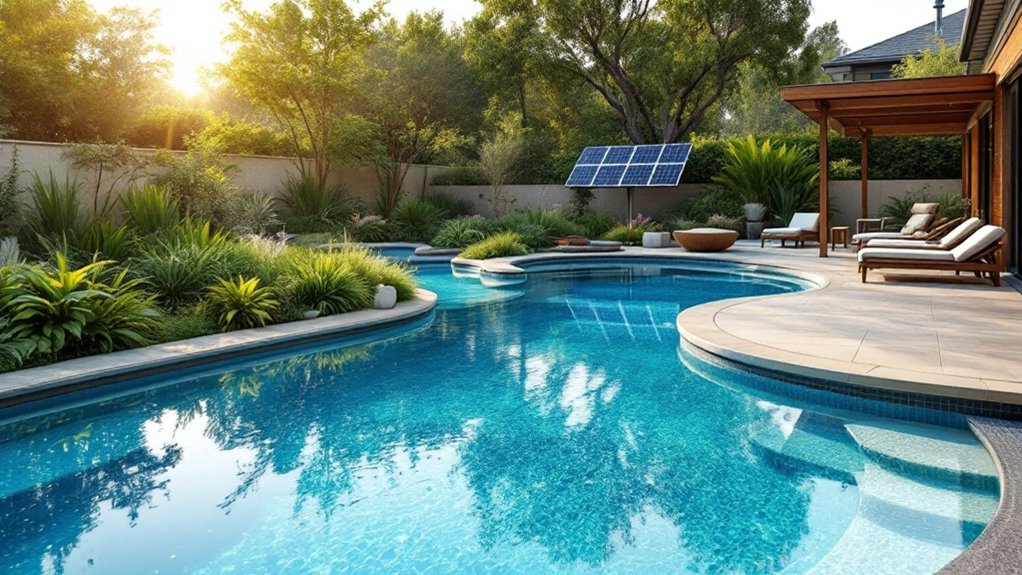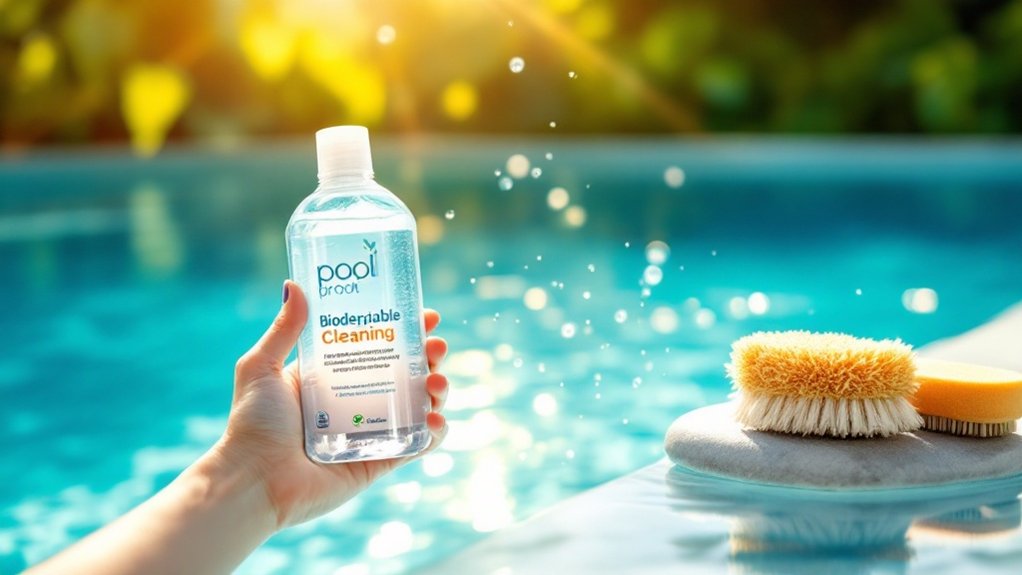Choosing eco-friendly pools for a backyard presents a range of advantages. They contribute positively to the environment while offering cost savings and energy efficiency. The use of natural filtration systems minimizes chemical exposure, promoting better health for families. Additionally, sustainable materials enhance the pool’s aesthetic appeal. As homeowners consider these factors, the question remains: how can an eco-friendly pool transform both outdoor spaces and lifestyles?
The Environmental Benefits of Eco-Friendly Pools
Although many homeowners seek relaxation in their backyards, the choice of pool can greatly impact the environment. Eco-friendly pools, designed with sustainable materials and practices, offer numerous environmental benefits. These pools often utilize natural filtration systems, considerably reducing the need for harmful chemicals that can leach into local water systems. Additionally, they frequently incorporate energy-efficient heating solutions, lowering energy consumption and greenhouse gas emissions. The landscaping surrounding eco-friendly pools typically features native plants, which require less water and provide habitats for local wildlife. By selecting an eco-friendly pool, homeowners not only enhance their outdoor space but also contribute positively to their local ecosystem, promoting biodiversity and encouraging sustainable water management practices in their communities. Regular water quality maintenance ensures that the pool remains safe and healthy for both swimmers and the environment.
Cost Savings and Energy Efficiency
Eco-friendly pools offer significant cost savings and energy efficiency for homeowners. By utilizing advanced technologies, these pools can lead to lower energy bills and reduced water usage, while also minimizing maintenance costs. This combination not only benefits the environment but also enhances the overall financial sustainability of pool ownership.
Lower Energy Bills
Lower energy bills serve as a significant incentive for homeowners considering eco-friendly pools. These pools often utilize energy-efficient technologies, such as solar heating systems and variable-speed pumps, which consume less electricity compared to traditional pool equipment. By harnessing renewable energy sources like solar power, homeowners can further reduce their reliance on grid electricity, leading to substantial savings over time. Additionally, eco-friendly pools generally require less energy for maintenance and filtration, making them not only environmentally responsible but also financially prudent. As energy costs continue to rise, the long-term benefits of lower operational expenses become increasingly appealing. Ultimately, investing in an eco-friendly pool can result in a more sustainable and cost-effective backyard oasis.
Reduced Water Usage
When homeowners prioritize reduced water usage in their pool designs, they not only contribute to environmental conservation but also achieve significant cost savings. Eco-friendly pools are designed to minimize water loss through advanced filtration systems and smart technologies that optimize water circulation. By incorporating features such as rainwater harvesting and efficient cover systems, these pools can drastically lower the amount of water needed for maintenance. This reduction in water usage translates to lower utility bills, as homeowners spend less on water replenishment. Additionally, energy-efficient pumps and heating systems further enhance savings by requiring less energy for operation. Ultimately, eco-friendly pools represent a sustainable choice that safeguards both the environment and household finances.
Minimal Maintenance Costs
A significant advantage of eco-friendly pools is their minimal maintenance costs, which can lead to substantial savings over time. Traditional pools often require extensive chemicals, frequent cleaning, and high energy consumption for filtration. In contrast, eco-friendly pools utilize natural filtration systems and energy-efficient pumps, reducing both chemical and energy needs. As a result, homeowners can expect lower utility bills and reduced spending on maintenance supplies. Additionally, many eco-friendly designs incorporate durable materials that require less frequent repairs or replacements, further enhancing cost-effectiveness. The long-term financial benefits, combined with their environmental advantages, make eco-friendly pools an appealing choice for those looking to save money while enjoying their backyard oasis.
Natural Filtration Systems Explained
Natural filtration systems offer a sustainable alternative to traditional pool maintenance methods. These systems utilize natural processes to keep water clean and clear, reducing the need for chemical treatments. Understanding the benefits and mechanics of natural filtration can help homeowners make informed choices for eco-friendly pool options.
Benefits of Natural Filtration
While many homeowners seek to enhance their backyards with pools, the benefits of natural filtration systems offer an eco-friendly alternative to traditional chlorinated options. These systems utilize biological processes and natural materials to maintain clean and clear water, reducing reliance on harsh chemicals. This approach not only promotes a healthier swimming environment but also minimizes the ecological impact associated with chemical runoff. Additionally, natural filtration systems often require less maintenance and can lead to lower operating costs over time. They create visually appealing landscapes, integrating seamlessly with the surrounding environment. Homeowners can enjoy a more sustainable pool experience while also contributing to the preservation of local ecosystems, making natural filtration an attractive choice for environmentally conscious individuals.
How It Works
Understanding how natural filtration systems function reveals their effectiveness in maintaining pool water quality without chemicals. These systems utilize a combination of plants, gravel, and beneficial bacteria to create a balanced ecosystem. Water is circulated through layers of natural materials, where impurities are filtered out by the gravel and absorbed by plant roots. The plants not only provide oxygen but also absorb excess nutrients, preventing algae growth. Additionally, the beneficial bacteria break down organic matter, further purifying the water. This method mimics natural water bodies, promoting a self-sustaining environment that requires minimal maintenance. By harnessing the power of nature, these filtration systems offer a holistic approach to pool care, ensuring clean and clear water while being environmentally friendly.
Sustainable Materials for Pool Construction
When selecting materials for pool construction, homeowners increasingly prioritize sustainability to minimize environmental impact. Eco-friendly options such as recycled steel, which offers durability and strength, are becoming popular choices. In addition, natural stone, sourced responsibly, provides an attractive and sustainable alternative to traditional materials. Concrete alternatives like permeable pavers allow for better water absorption, reducing runoff and promoting groundwater replenishment. Solar heating systems, while not a construction material per se, integrate seamlessly into the design, utilizing renewable energy. Moreover, non-toxic sealants and finishes guarantee that harmful chemicals do not leach into the surrounding environment. By choosing sustainable materials, homeowners not only create a beautiful outdoor space but also contribute to a healthier planet for future generations.
Enhancing Your Outdoor Aesthetics
How can homeowners transform their backyards into visually stunning retreats? Eco-friendly pools offer a seamless blend of beauty and sustainability, enhancing outdoor aesthetics considerably. By integrating natural materials such as stone and wood, these pools harmonize with the surrounding landscape. Lush greenery and vibrant plantings can frame the pool area, creating a serene oasis that invites relaxation. Water features, such as fountains or waterfalls, enhance visual appeal while promoting a calming ambiance. Additionally, energy-efficient lighting can accentuate the pool’s beauty during the evening, illuminating pathways and creating a magical atmosphere. Homeowners can further personalize their spaces with eco-friendly accessories, like bamboo loungers and recycled materials, ensuring that their backyards are not only attractive but also environmentally responsible.
Healthier Swimming Experience for Your Family
Eco-friendly pools not only enhance aesthetics but also promote a healthier swimming experience for families. These pools often utilize natural filtration systems, reducing reliance on harsh chemicals like chlorine. This leads to cleaner water that is gentler on the skin and eyes, making it ideal for children and those with sensitivities. Additionally, many eco-friendly pools incorporate features such as saltwater systems, which provide a more comfortable and soothing environment. The integration of natural elements helps maintain balanced water chemistry, further diminishing the risk of irritants. Families can enjoy peace of mind knowing their swimming experience is not only enjoyable but also safe and health-conscious. Ultimately, selecting an eco-friendly pool contributes to the well-being of all family members.
Frequently Asked Questions
How Long Does It Take to Install an Eco-Friendly Pool?
The installation of an eco-friendly pool typically ranges from four to eight weeks, depending on factors such as design complexity, site conditions, and materials used. Proper planning can streamline the process, ensuring timely completion.
Are Eco-Friendly Pools Suitable for All Climates?
Eco-friendly pools can be suitable for various climates, but their effectiveness may depend on local weather conditions and maintenance requirements. Proper design and materials can enhance performance and sustainability, regardless of environmental challenges.
What Maintenance Is Required for Natural Filtration Systems?
Natural filtration systems require regular maintenance, including monitoring water quality, cleaning filter media, and managing plant life. Routine checks guarantee ideal performance, preventing algae growth and maintaining the ecological balance essential for a healthy swimming environment.
Can Eco-Friendly Pools Accommodate Different Pool Shapes and Sizes?
Eco-friendly pools can indeed accommodate various shapes and sizes. Their flexible design options allow homeowners to create customized layouts, ensuring that aesthetic preferences and spatial constraints are met while promoting sustainable practices in pool construction.
Do Eco-Friendly Pools Increase Property Value?
Eco-friendly pools can enhance property value due to their sustainable design and lower maintenance costs. Homebuyers increasingly prioritize environmentally friendly features, making such pools an attractive investment that reflects modern living standards and ecological responsibility.
Conclusion
To sum up, eco-friendly pools present an array of advantages that extend beyond mere aesthetics. By prioritizing environmental sustainability, they contribute to a healthier planet while offering significant cost savings and energy efficiency. With natural filtration systems and sustainable construction materials, these pools provide a safer swimming experience for families. Ultimately, investing in an eco-friendly pool not only enhances one’s outdoor space but also fosters a lifestyle that aligns with ecological responsibility and well-being.




